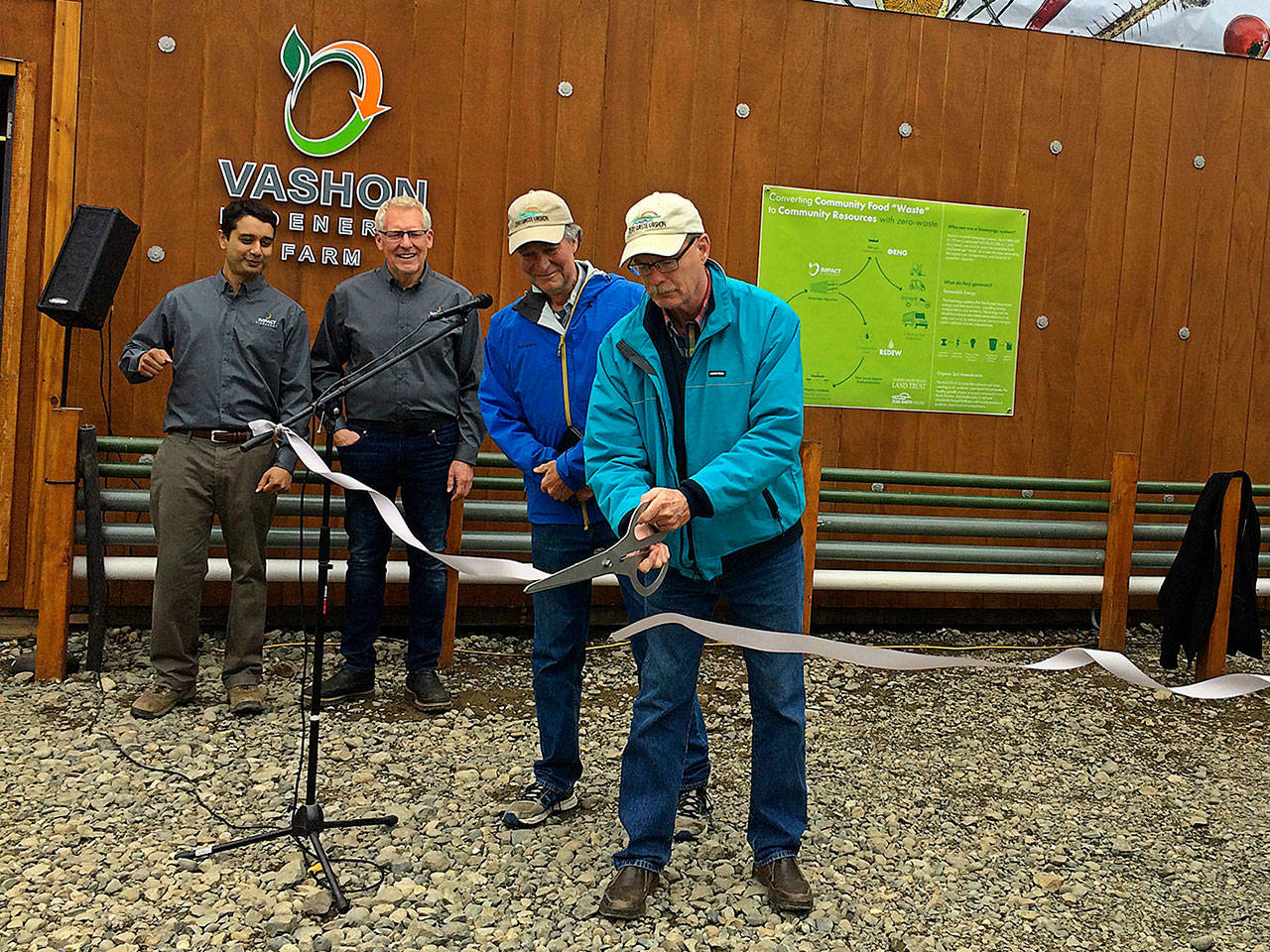Impact Bioenergy, a manufacturer of systems that convert organic food waste into usable energy and fertilizer, unveiled its new anaerobic digester at the Island Spring Organics tofu factory Tuesday.
The project, supported by the State Dept. of Commerce’s Clean Energy Fund, the State Housing Finance Commission’s Sustainable Energy Trust, King County Department of Natural Resources and Parks and others, is able to derive methane and carbon dioxide from food waste that is broken down by bacteria — the process creates biogas, which can be treated and used to generate energy.
The digestate not “upcycled” into fuel is rich with nutrients and can be used for improving soil. The Vashon-Maury Island Land Trust, which grows produce at nearby Matsuda Farm, took notice — last November it received a $10,000 grant from the Sustainable Path Foundation to use it on cover crops as part of a trial program.
Srirup Kumar, community engagement officer for Impact Bioenergy, said the anaerobic digester and Vashon Bioenergy Farm is part of a year-long demonstration project that will show what the system can do with the tofu factory’s waste stream, most of which consists of okara and whey, two byproducts of the ingredients used to produce tofu.
Kumar said he hopes the Land Trust will be a key partner with Impact Bioenergy and one day be able to attest to how much value there is in the plant food yielded by the digester. That fertilizer, he said, would go a long way to fulfilling the Land Trust’s goals for growing produce at Matsuda Farm.
“Their entire vision is to really build the [island] food system to go from farm to the schools, that pipeline on the island, and go from farm to the food bank,” said Kumar.
Tom Dean, Land Trust executive director, said in an email that the grant funding from Sustainable Path will help provide hard data on using the fertilizer effectively. He added that he hopes more investors will be encouraged by the results.
“It’s a great [example] of how you can close the carbon and nitrogen loops in a small community — working locally to reduce carbon use and to increase resilience to a changing climate,” he said.
Kumar said Impact Bioenergy intends to build an island subscription-based model similar to a crop share association, only with compost. Its success depends on what the Bioenergy Farm’s Nautilus, a large modular recycling system and natural gas hub, will be able to recover from the food waste it processes from the tofu factory and, Kumar said, potentially other sources within a few months.
“We call it waste, but it happens to be one of the highest value materials that we have today in households, in businesses, in schools, everywhere,” he said.
Eventually, Impact Bioenergy hopes through recycling to generate enough compressed natural gas to power vehicles on the island. For every 60 to 80 pounds of material it collects, Impact Bioenergy’s system can extract and generate the equivalent of 1 gallon of gasoline, according to a press release.
Luke Lukoskie, the owner of Island Spring Organics, said the factory produces almost 1 million pounds of certified organic tofu and other soy-based products every year. But with that much product, he said, they end up with more than a few spent soybeans.
“Now we’re going to have, within a stone’s throw of the plant, the ability and partnership to not only utilize all of our organic waste,” he said, “but additionally to be able to [produce] heat, renewable natural gas, electricity, etc. from the process … I’ve been dreaming of this day literally for 44 years.”
Between the application of biogas as an alternative fuel to the properties of the digestate as a fertilizer, Lukoskie said he is thrilled something renewable could be done with the factory’s waste.
“I’ve always known there was additional value in the garbage,” he said.
This version of the story clarifies when the Nautilus recycling system will be fully operational.



